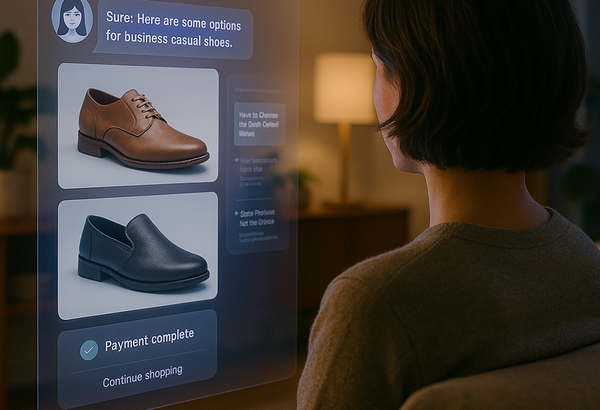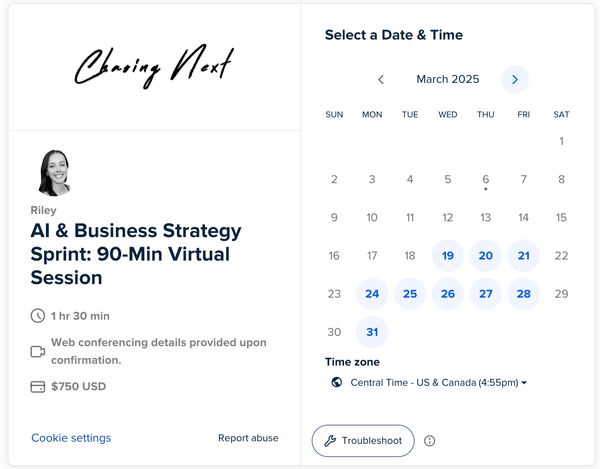AI’s Next Big Shift: From Chatbots to Autonomous Agents
AI is evolving from reactive assistants to autonomous agents that act on your behalf. Here’s what that means for the future of work, home, and everyday life.

We’re not in the true AI age yet.
Right now, AI is reactive.
It's a powerful tool, but one that still relies on humans to drive the action.
Today:
- Chatbots answer questions.
- AI integrations improve workflows.
- Automations help streamline processes
But none of it is truly proactive.
Proactive AI will autonomously work for you, anticipating your needs, and executing tasks for you with limited intervention.
AI Today: Fragmented and Reactive
If you want to use AI today, most people have a few options:
- Chatbots: ChatGPT, Claude, and Gemini respond to prompts, but don’t take action.
- AI Integrations: Notion AI, Google’s AI features, etc. assist, but don’t coordinate across tools.
- Automation Platforms: Zapier and Make let you build complex workflows that connect AI to applications, but you still manually set rules and triggers.
- Advanced AI Models: Can be fine-tuned for business use, but they require expertise and infrastructure.
- In-House AI Builds: Companies can create proprietary AI systems trained on internal data, but these require technical expertise and remain siloed.
AI today is fragmented.
It’s powerful, but it doesn’t work together and it still needs constant human direction.
The Transition: What’s Happening Now
We’re seeing the first steps toward a proactive AI era with emerging AI agents.
Agents are systems designed to think, plan, and act independently with limited human interference.
Recent developments include:
- OpenAI’s Operator: Released in January, but only available to OpenAI's $200/month Pro subscribers. Operator can autonomously complete tasks using a web browser, such as booking travel, making restaurant reservations, and shopping online.
- Manus AI: Developed by the Chinese startup Monica, Manus is an autonomous AI agent capable of independently performing multi-step tasks across various domains, going beyond traditional chatbots. Manus is currently in beta, but you can apply for the waitlist through their site.
- Salesforce’s 2DX AI Agents: Salesforce recently announced Agentforce 2DX a step towards autonomous AI. Their new tech can fully automate business tasks like handling customer support requests, managing sales pipelines, and processing paperwork without human oversight. These agents can operate inside Salesforce’s platform and connect to other business tools.
- Adobe Experience Platform Agent Orchestrator: Adobe’s new framework lets businesses build and manage AI agents for marketing, personalization, and automation. They introduced ten purpose-built AI agents and Brand Concierge, an AI-driven experience for personalized customer interactions. These agents integrate with Adobe Experience Cloud and third-party enterprise platforms such as Microsoft, AWS, and ServiceNow.
The above examples are primitive. We are in the early days of AI.
Agents will become increasingly more capable and accessible. As they evolve, agents will impact both life and business, making their presence feel effortless.
The Future: AI That Works For You
Here’s what AI may look like as it shifts from reactive to truly proactive:
1) Your AI Assistant Becomes Truly Personal
Today’s assistants (Siri, Alexa, Google Assistant) are limited voice search tools. Future AI will actually be able to assist with life tasks.
- It will manage emails, set schedules, and summarize what actually needs your attention.
- It will use your tools, knowing your workflow across apps and taking action.
- It will act before you ask, anticipating your needs based on context.
2) AI Will Reshape the Workplace
You've been hearing that AI will replace jobs and certain functions. Agents are the technology that will enable this.
- Companies will hire AI instead of employees. OpenAI is allegedly creating AI agents to replace specialized workers such as sales leads and software engineers which will cost between $2K-$20K per month.
- Beyond automating routine tasks, AI agents will increasingly handle specialized workflows and even strategic business decisions, requiring far less human oversight.
3) AI Will Be Embedded in Everyday Life
AI will be integrated everywhere. It will be built into wearables, glasses, and smart devices.
- Augmented reality will expand. AI-powered smart glasses like Meta’s AI-enhanced Ray-Bans will overlay real-time information onto the world. They will translate languages, identify landmarks, and pull up relevant insights.
- AI will provide real-time assistance, feeding insights into your ear, helping translate languages, or providing other important details.
4) AI Will Optimize Your Home & Health
AI will refine daily life by anticipating needs and automating tasks before you even ask.
- Smart homes will adjust lighting, temperature, and security based on your habits and preferences.
- AI will monitor your health in real-time, track vital signs, book doctor's appointments, and even suggest lifestyle enhancements.
The AI Age Is Just Getting Started
The AI we see today is powerful, but primitive compared to what’s coming.
The breakthrough isn’t simply better chatbots or automation; it's truly autonomous agents that can think, plan, and act on their own. As agents evolve, automation won’t be something you set up; it will proactively adapt to your needs in real-time.
This is the shift that will define the AI age. And it’s being built right now.
Unlock AI’s Full Potential in Your Business
I run AI & Strategy Sprints to help you:
- Identify where AI agents can drive the most impact in your workflows
- Automate high-value tasks and free up time for strategic work
- Navigate the shift from reactive AI tools to proactive AI integration
DISCLAIMER: This content is for informational purposes only and does not constitute business, investment, legal, financial, or tax advice. Readers should conduct their own research and consult with professional advisors before making business decisions.





